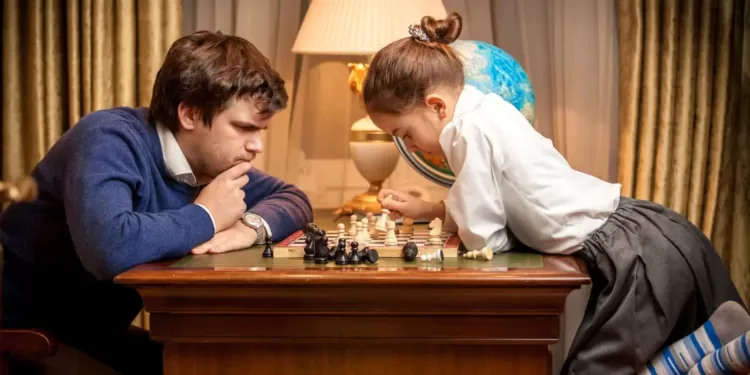Chess abilities and age, do they have a relationship? If so, how does age affects Chess ability? Well if you research Chess Grandmasters and find out how old they were when they became a GM, you’ll see that many of them achieved the title in their teenage years. Many of them even before 15 years of age. In fact, the record for the youngest Grandmaster in the history of the game was recently broken by Abhimanyu Mishra.
If you’re older and just started playing Chess like me, you might be wondering, does age affect my ability to improve in chess? That’s what this article is all about. We’re talking about the relationship between age, cognition, and Chess ability.
Does Age Affect Chess Ability?
As is the nature of life, there comes a time when the body and brain attain peak performance right before age takes a toll. Biologically, mass, muscle, and strength begin deteriorating at the age of 30. This is unlike chess which makes the brain age slower once you hit 30 years.
Based on individual performances and age, scientists investigated how different generations of chess players reached their optimum range. Evidence shows that after more than 125 years of research, it has come out evidently that chess players do not attain peak level until 30 years (Cassella, 2020). Here are further facts.
How Does Aging Affect Chess Abilities?
The decline of Cognitive Ability
In light of the age and other factors such as the duration of the game, opponent’s strength, and the color of the chessboard, scientists discovered that cognitive capabilities associated with playing chess begin declining after 45 years. The evidence further indicated that in their early 20s, chess players’ abilities and performances increases rapidly (Cassella, 2020). By the age of 35, the skills and techniques reach a plateau-like stage which lasts till the late 30s and early 40s. By 45 years, the creativity and critical thinking power begin to recede gradually.
The fact that chess data, tournaments, and other global competitions have carefully been recorded over time creates the imprint that neuroscientists and psychologists can rely on the statistics revealed. Another evidence-based study shows that with each chess move, there is a reflection of the quality of an ideal performance vital in completing a respective cognitive task in life (Yirka, 2020). The article continues to agree with Cassella’s perspective that peak levels in chess range between 30-35 years of age. It is undeniable that human beings’ cognitive abilities generally hit the peak at 35 and begin declining within five years.
Gradual Decline of Chess Performance unlike Other Physical Activities
Many physical activities require attaining a certain age limit for maximum performance and realization of desired goals. Unlike many physical activities, chess performances and techniques decline at a slower rate. Take, for instance, an activity like swimming which involves engaging the whole body and using a substantial amount of energy. It is unlike playing chess which limits many physical activities and limits you to making handy moves and slight body adjustments here and there. Concerned, scientists decided to investigate the difference in performance productivity of chess and other physical activities. They discovered the following.
Mostly for expert or professional chess players, it came out clearly that their peak performance lasts only 10 years. Cassella’s (2020) assertion declares that most players have their abilities peak at the age of 30, which declining by 40 years. An equally reliable study concurs by adding that after the scientific assessment of all professional chess tournaments played between 1890 and 2014, the clear indication was that the early 20s and 30s were the ultimate peak performance age (Masterson, 2020). That aside, scientists also sought to determine how experience and age can affect chess performance. They discovered the following.
The Irony of More Experience Attracting Younger Players
With the inception of the digital era in the early 90s, it meant that teens and young adults got early exposure to chess, its history, tournaments, rules, and potential prospects. As opposed to chess back in the day, this new generation of players had extreme experience with little age limits. Scientists discovered that most inexperienced chess players, especially older adults in their late 20s, could not attain peak level performance until they hit 37 years (Cassellas, 2020).
There is no doubt with the ideal resources and experience, anyone can attain peak-level cognitive abilities in chess performance. Since most of the chess studies were based upon professionals, the overall idea is that the better half of cognitively developed personalities participated in the research. It means that if the current generation of young men can reach and hold the same skills, techniques, then attaining cognitive ability is no longer a mid-life affair. According to Chess.com (2021), by the time a chess player is around 75 years, they are usually 200 points below the standard peak performance level.
Key Take Away
Staggering evidence points to the direction that chess is a young man’s game. Nonetheless, this does not mean that you cannot learn chess past the optimum performance age limit. If anything, defying boundaries and exceeding life limits is how chess equips players with the necessary creativity, techniques, strategies, and critical thinking skills to deal with various situations successfully.
Research shows that not many older adults or seniors participate in chess tournaments (Wiesend, 2020). This fact shows that the chess culture is slowly evolving from the older adults’ age group to the now active young adults in their early 20s and 30s. Still, who is to say that you cannot play professional chess because you are below 15 or above 55 years? No one can deny you the opportunity to do what you like, and nothing can stop your path towards achieving your dreams.
I hope this article on how age affects Chess ability gave you some helpful information on aging and Chess. If you liked this post, you might also be interested in reading about if Grandmasters have a high IQ and if Chess requires a high IQ.
Sources
- Cassella, C. (2020). A 125-Year study of chess matches suggests we don’t peak at the game until our 30s. Humans.
https://www.sciencealert.com/scientists-analyse-125-years-of-chess-games-to-find-the-age-when-we-play-best - Chess.com. (2021). Aging and chess abilities. Chess Forums. https://www.chess.com/forum/view/general/aging-and-chess-abilities
- Masterson, V. (2020). This study of 1.6 million chess moves found the age we hit our cognitive peak. World Economic Forum.
https://www.weforum.org/agenda/2020/10/chess-study-suggests-human-brain-peaks-at-35-years-of-age/ - Wiesend, B. (2020). Researching age-related decline. Chess News.
https://en.chessbase.com/post/the-age-related-decline-in-chess - Yirka, B. (2020). The study of chess player performance over many years suggests brain peaks at age 35. Medical Express.
https://medicalxpress.com/news/2020-10-chess-player-years-brain-peaks.html


